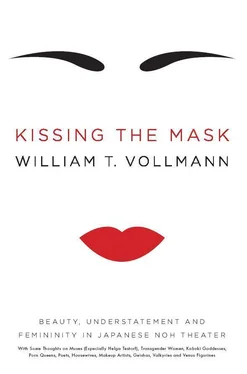It is said that he once heard the cuckoo singing on Sado, and remembered the flowers of Kyoto, because when the cuckoo sang there, the flowers were in bloom.
“I can’t help thinking about the capital today,” we overhear voyagers repeating on a certain New Year’s Day in the tenth century. “I wonder how it all looks — the straw festoons, with their mullet heads and holly, at the gates of the little houses.” And just before performances start, I myself, hearing through the curtains of Euro-American theaters what Proust compares to the sounds within an egg just before it hatches, am compelled to wonder who and what I will see. Thus likewise the moment when the geisha is giggling at the bottom of the teahouse stairs and the musician is tuning her shamisen. Will Kaguyahime herself appear to me, or shall I make do with some imitation? No doubt Zeami treasured his own anticipations.
In a Noh theater, of course, not a sound passes through the rainbow curtain. How could I have ever expected to perceive anything but silence? As a human being in a world of gods, as a lover where my beloved is, a deaf and blinking spectator in Noh theaters, I am base . The mask gazes at me without seeing me. It is incomparably above me.
In Kanazawa I see a shrine tree overlined with snow, people clapping three times and throwing their coins into the box with a dry rattling sound, the sky grey and yellow, in the snow a dark puddle trembling with pale gold reflected fire. What happens to those coins? Do their Platonic forms reach the capital?
Spying snow on bamboo leaves, I try to imagine snow in a silver bowl. Well, I’m a good ape; I know it must be as white as a koto’s thirteen strings—
In Sado I live and breathe, my progress of inhalations and exhalations as steady as the pond of blue sky in the thunderheads above the ocean.
I see a crescent of perfect snow upon the beach’s leaden sand, colored along one side, as if eyelined, with rusty grass. The bay is calmer, hence bird-ridden; the ice is hard. A line of birdprints on the snow seems to have been made by a single foot. What would it mean to tread this stage? Where could I go? Where can I go on this prison island, this world?
THE PROPER ENVIRONMENT
What is the capital, but the abode of grace? And what is grace? What does Kaguyahime possess that a denizen of Akashi lacks? Her robe must be equivalent to one of those Edo-era Noh costumes of gold thread and silk embroidered with flowers, which outshine anything I could ever hope to wear. One would need connections in the capital to obtain such treasures. But more fundamentally, grace must derive from the woman’s inner being — although the proper environment brings it out, of course. “Thus by living in the capital” and performing before refined spectators, writes Zeami in “Kakyo,” “the actor is in the proper environment, and the insufficiencies in his art will naturally disappear.” I suppose that when she departs the capital to take up residence with me in Akashi, insufficiencies in her art will naturally reappear.
Nara-era maidens combing their morning hair, will their combing slowly lose its grace once they get married and carried off to Akashi?
Gazing at my female self, quite mindful of Yukiko’s categorization of her clients as narcissists, I nonetheless feel excited into joy. Have I crossed the abyss, then? Was there an abyss at all, or was the gulf, as some transgender people would have it, the merest figment of prejudice and ignorance? Who is this woman in the mirror?
When Mr. Umewaka becomes Yuya in the mirror room, who is he? Noh actors and Inoue School dancers aim to feel nothing; Odori dancers do the opposite. When the sorcerer in “Yokihi” travels through space to meet Lady Yang, when Zeami departs for Sado, when I face my own death, or myself as the opposite gender, or some biological woman whom I desire or love or whose love I have lost, or some mask of beauty, what is common to all of these?
Whatever that commonality might be, it surely lives within me already. Mr. Umewaka is his own Yuya; he cannot become entirely alien to himself. And when I first emerge into a traditional garden in Kyoto, the shrine’s wooden overhang forms a space partway between inside and outside. The air touches me but my gaze continues to be framed within a rectangle, so that, to borrow from Shakespeare, the world becomes a stage. And there I am, character and audience.
The tiny eyes and lips of an Utamaro beauty bejewel the old print, and I regard their stylized grace. Utamaro and his model have both long since turned to smoke; anyhow, the woman represented by this bijin-ga must have been more individual than this. So has my attachment merely been tricked forth? Is deception the common element of allure in this floating world?
A beautiful woman named Nancy sits in church in Provincetown, Massachusetts, gazing diagonally, as do the congregation’s other members, out of the black and white photograph; her large hands are clasped in her lap, and if she is in her middle thirties then her face is a trifle worn for a woman’s but smooth for a man’s. In a sweet color photograph from the following year she stands in a meadow beside her Aunt Ida May, both of them holding uprooted plants, Nancy with her left hand, Ida May with the right, and Ida May is saying something just to her while Nancy in her pink blouse and floral slip gazes again diagonally beyond us. In church Nancy had wavy hair. Now she has straight hair and bangs. The year after that, Nancy stands nude in her home in Cambridge, with her hand on her hip, looking younger than ever, large-eyed and small-breasted, so beautifully feminine, slim-bodied like an adolescent girl, and a penis hangs between her legs. In this portrait only does she gaze directly at us. Who is she? Is the mystery of who she is any more enigmatic than yours or mine, or Mr. Umewaka’s? A mask is a lie, of course, but by virtue of being so, it leaves behind many of flesh’s native-born accidents, asserting a specific being, and hence, if you believe that we can make our destinies, truth. All the same, who is Nancy? What does it mean to desire her as a man desires a woman? Who would Nancy be to me if I had never seen her nude, if I never knew that she possessed a penis?
I quote again in full Shun’e’s advice to Chomei that
when one gazes upon the autumn hills half-concealed by a curtain of mist, what one sees is veiled yet profoundly beautiful; such a shadowy scene, which permits free exercise of the imagination in picturing how lovely the whole panoply of scarlet leaves must be, is far better than to see them spread with dazzling clarity before our eyes.
And I also quote the seventeenth-century Chinese writer Lu Yu: “A man’s true feeling for a woman does not arise from the bodily contact, but from the eye contact that precedes it.”
Would Nancy prefer me not to know about her penis? Would she rather be half-concealed by a curtain of mist? If so and if not, what does her posing for a public portrait signify? Who is she? Is her womanhood substantially other than Mr. Umewaka’s? If she lived in the capital and performed only before refined spectators, would I never guess that her body was partly male? If I were attracted to her without knowing, then found out, would my reaction be disappointment, revulsion, or an awed grief that someone beautiful and plausible in her grace, the half-existing biological woman whom I had believed in, was now flying away forever to the moon? Or would my attraction be unchanged? — If I never desired her, if I loved her only as a friend, then I would be indifferent if my conception of her gender changed. I know that I could continue to treat her as I would treat any woman, employing appropriate pronouns and compliments. In fact, I might admire her performance. — But what is grace? Perhaps (this also I resist) it is the space between fascination and fulfillment. Fascination, as you may recall, Zeami defined as the sensation before the consciousness of that sensation. Fulfillment, he says, is the union of becoming and of settling in place. The cherry blossom falls. Sakagami departs, and Semimaru completes his tale forever in the blind immobility which might almost be death.
Читать дальше












